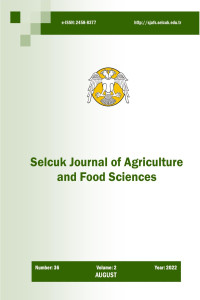Determination of Disease Severity and Anastomosis Groups of Rhizoctonia solani Isolates from Chickpea Plant in Konya Province
Abstract
This study was carried out to determine the anastomosis groups and disease severity of Rhizoctonia solani, which causes root and root collar rot in chickpea production areas in Konya. A total of eleven isolates of Rhizoctonia spp. were obtained in the isolations made from the root and root collar of the plants in the surveys. Rhizoctonia isolates examined microscopically were grouped as multinucleate, binucleate according to the number of nuclei. Ten isolates were multinucleate and identified R. solani, while one isolate was binucleate Rhizoctonia sp. In pathogenicity tests, five multinucleate isolates were found to be pathogenic. Disease severity was determined as 100% for 1.2 A and 1.2 B coded isolates, 86% for 1.1 A coded isolate, 75% for 1.1 B coded isolate, and 44% for 1.2 C coded isolate. It was observed that the other multinucleate five isolates caused only a shortening in plant heights. No disease symptoms were observed in the plants inoculated by the binucleate isolate. All isolates were characterized using the internal transcribed spacer (ITS) region of ribosomal DNA, and two different anastomosis groups were defined accordingly. It was determined that 5 virulence multinucleate R. solani isolates belonged to AG-4 HGII and 5 other multinucleate isolates to AG BI anastomosis group.
Details
| Primary Language | English |
|---|---|
| Subjects | Botany |
| Journal Section | Research Article |
| Authors | |
| Publication Date | December 25, 2022 |
| Submission Date | September 16, 2022 |
| Published in Issue | Year 2022 Volume: 36 Issue: 3 |
Cite
Selcuk Agricultural and Food Sciences is licensed under a Creative Commons Attribution-NonCommercial 4.0 International License (CC BY NC).

